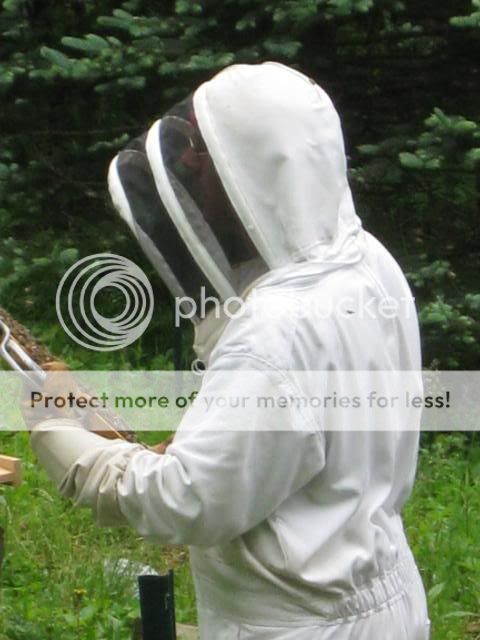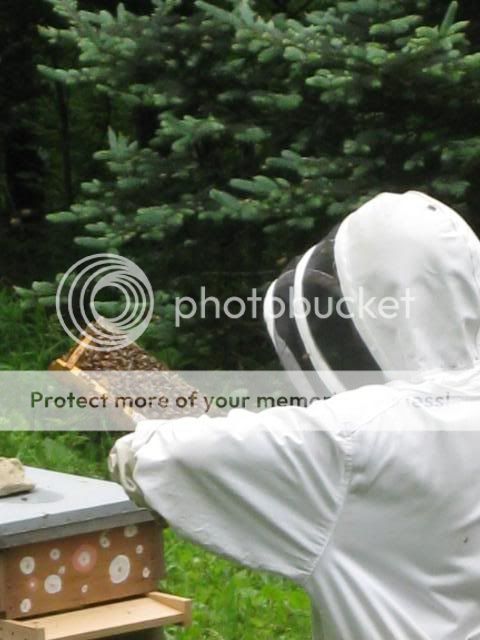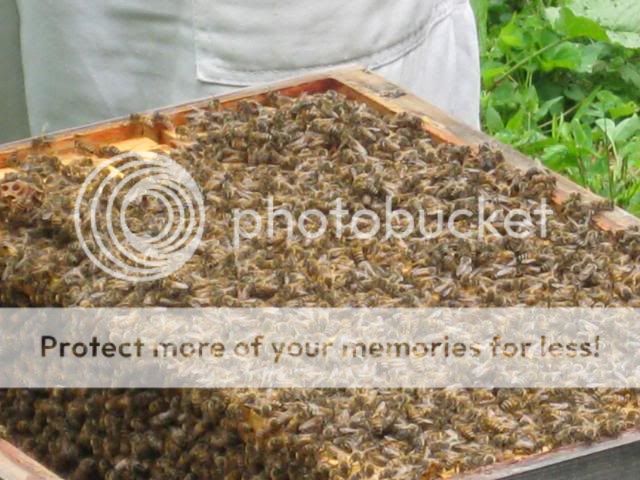Navigation
Install the app
How to install the app on iOS
Follow along with the video below to see how to install our site as a web app on your home screen.
Note: This feature may not be available in some browsers.
More options
You are using an out of date browser. It may not display this or other websites correctly.
You should upgrade or use an alternative browser.
You should upgrade or use an alternative browser.
bees
- Thread starter strollingbones
- Start date
waltky
Wise ol' monkey
20,000 Bees Die Over 2 Days in Canada...

Probe on after 20,000 bees die at Royal Ontario Museum
February 12, 2011 - The Royal Ontario Museum launched an investigation Friday into the sudden death of 20,000 bees on display in a glass-encased hive.
Probe on after 20,000 bees die at Royal Ontario Museum
February 12, 2011 - The Royal Ontario Museum launched an investigation Friday into the sudden death of 20,000 bees on display in a glass-encased hive.
"All 20,000 bees died within 48 hours," Amanda Fruci, publicist for the Toronto museum, told AFP. "The cause is being investigated but we know for sure that it wasn't colony collapse syndrome because that involves bees leaving a hive and never coming back, and in this case they all died in the hive." In normal times, bee communities naturally lose around five per cent of their numbers. But with the syndrome known as colony collapse disorder (CDD), a third, half -- sometimes even 90 per cent or all -- of the insects can be wiped out.
In the United States, government figures released last year showed a 29-per-cent drop in beehives in 2009, coming on the heels of declines of 36 and 32 per cent in 2008 and 2007. Mysterious decimation of bee populations have also been reported in Europe, Japan and elsewhere in recent years, threatening agricultural crops that depend on the honey-making insects for pollination.
Thousands of visitors had viewed the bees at work in a specially designed glass hive in the museum's popular hands-on biodiversity gallery over the past two years. They were perfectly healthy until last week when they suddenly died. The museum has already ruled out starvation or errors by staff as causes of death, but said poor ventilation, a parasite or too few worker bees to keep the comb warm over the winter may be to blame.
Source
Mr. H.
Diamond Member
Cdb? Db s a bzb
Big Black Dog
Platinum Member
- May 20, 2009
- 23,425
- 8,069
- 890
That's just the bee's knees!
waltky
Wise ol' monkey
Granny says its the beasts of the earth turnin' on us - like it says inna Bible...

Bees sting elderly couple to death in Texas
4/20/2011 - Investigator says the insects were likely Africanized honey bees often called 'killer bees'
Bees sting elderly couple to death in Texas
4/20/2011 - Investigator says the insects were likely Africanized honey bees often called 'killer bees'
An elderly South Texas couple died and their son was injured after a swarm of bees attacked them on their remote ranch, authorities said on Wednesday. William Steele, 95, and his wife, Myrtle, 92, died and their son, Richard, 67, was injured after bees attacked them as they tried to clean a hunting cabin on their ranch near Hebbronville on Monday, an investigator with the Jim Hogg County Sheriff's Office said. "It was a terrible thing," Investigator Reyes Espinoza told Reuters. "You don't prepare for something like that."
Richard Steele told investigators he and his parents were attacked after they moved a wood stove in the cabin and exposed a hive of bees, Espinoza said. The son immediately drove about 15 miles to the nearest road, where he managed to call for help on a cell phone. William Steele tried to escape the bees by running from the cabin, but he fell and succumbed to hundreds of bee stings, Espinoza said. Myrtle Steele was airlifted to a Corpus Christi hospital, where she died on Tuesday. Her son was transported to a Laredo hospital and released, Espinoza said.
Espinoza said the bees swarmed deputies when they arrived at the scene on Monday. "By the grace of God, we didn't get stung," he said. "You could literally scoop them off of us." Espinoza said they were likely Africanized honey bees -- often called "killer bees" for their aggression -- which are common in south Texas.
The bees are hybrids from swarms originally introduced to Brazil from Africa, which absconded in the 1950s. They spread north through South and Central America, crossing into south Texas in 1990, according to the U.S. Department of Agriculture. The bees swarm more frequently than native bees, and are extremely defensive. The USDA advises untrained individuals against trying to remove swarms. If attacked, individuals should run away quickly and not stop to help others. Fatal attacks are rare, although the USDA gave no figures.
Bees sting elderly couple to death in Texas - US news - Life - msnbc.com
AllieBaba
Rookie
- Oct 2, 2007
- 33,778
- 3,927
- 0
- Banned
- #11
Good lord,waltky!
Great pics Bones! I LOVE bees! I love honey, for that matter. I ate a lot of honey today at work. I kept making toast and eating it alternately with honey, and peanut butter. When a coworker came back to the office from a training trip, she said it smelled like I was baking bread, haha.
Anyway, I LOVE bees.
And my son is allergic. Poor little dude. The first time he was stung was a couple of years ago, when he still believed his fake karate moves were effective against all manner of threats. So the kids were playing in a mountain park, and stepped on a nest or something and all got nailed. But my boy stood his ground, sacrificing himself so that he could use his karate moves on the bees.
Then he ran for nana yelling "They aren't afraid! They aren't afraid!"
Great pics Bones! I LOVE bees! I love honey, for that matter. I ate a lot of honey today at work. I kept making toast and eating it alternately with honey, and peanut butter. When a coworker came back to the office from a training trip, she said it smelled like I was baking bread, haha.
Anyway, I LOVE bees.
And my son is allergic. Poor little dude. The first time he was stung was a couple of years ago, when he still believed his fake karate moves were effective against all manner of threats. So the kids were playing in a mountain park, and stepped on a nest or something and all got nailed. But my boy stood his ground, sacrificing himself so that he could use his karate moves on the bees.
Then he ran for nana yelling "They aren't afraid! They aren't afraid!"
strollingbones
Diamond Member
- Thread starter
- #12
they are hybrids of native honeybees and killer bees or african bees....people will learn to live with the new aggressive bee....
Big Fitz
User Quit *****
- Nov 23, 2009
- 16,917
- 2,522
- 48
Okay, that's Uber cute.Good lord,waltky!
Great pics Bones! I LOVE bees! I love honey, for that matter. I ate a lot of honey today at work. I kept making toast and eating it alternately with honey, and peanut butter. When a coworker came back to the office from a training trip, she said it smelled like I was baking bread, haha.
Anyway, I LOVE bees.
And my son is allergic. Poor little dude. The first time he was stung was a couple of years ago, when he still believed his fake karate moves were effective against all manner of threats. So the kids were playing in a mountain park, and stepped on a nest or something and all got nailed. But my boy stood his ground, sacrificing himself so that he could use his karate moves on the bees.
Then he ran for nana yelling "They aren't afraid! They aren't afraid!"
I used to not be afraid of bees. My dad did Apiary as a hobby. Then one day he harvested a few combs when the bees were grumpy and he missed a spot in his coverings. He was stung over 100 times and became allergic to bee venom for many years before his body readjusted. I was scared of them after that.
strollingbones
Diamond Member
- Thread starter
- #14
an allergic reaction can kill you in minutes.....i dont work the bees as much as i did at the beginning...each sting caused more of a reaction....
Big Fitz
User Quit *****
- Nov 23, 2009
- 16,917
- 2,522
- 48
So have you named your stand yet? I want to know if I won... or whatever... LOLan allergic reaction can kill you in minutes.....i dont work the bees as much as i did at the beginning...each sting caused more of a reaction....
silly ego.
Similar threads
- Replies
- 22
- Views
- 290
- Replies
- 5
- Views
- 180
- Replies
- 7
- Views
- 2K
Latest Discussions
- Replies
- 23
- Views
- 132
- Replies
- 8
- Views
- 22
- Replies
- 105
- Views
- 370
- Replies
- 34
- Views
- 218
Forum List
-
-
-
-
-
Political Satire 9258
-
-
-
-
-
-
-
-
-
-
-
-
-
-
-
-
-
-
-
ObamaCare 781
-
-
-
-
-
-
-
-
-
-
-
Member Usernotes 497
-
-
-
-
-
-
-
-
-
-






